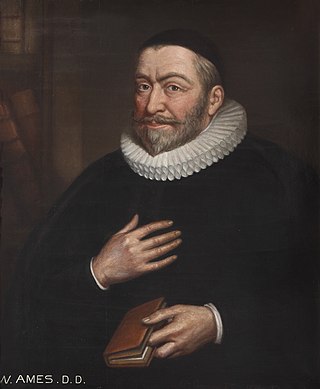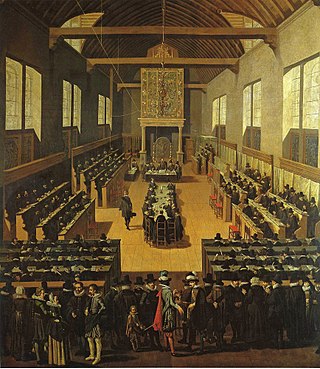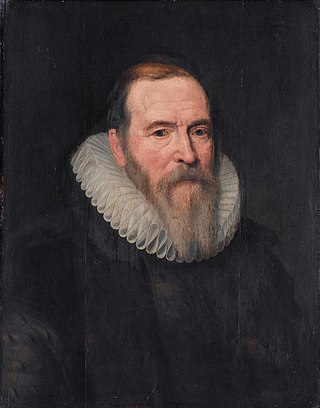
Nicolaas Grevinckhoven (Grevinchovius, Grevinghoven or Grevinchoven in German sources) (died 1632) was a Dutch Protestant minister, a combative proponent of the Remonstrant party.

Nicolaas Grevinckhoven (Grevinchovius, Grevinghoven or Grevinchoven in German sources) (died 1632) was a Dutch Protestant minister, a combative proponent of the Remonstrant party.
He studied in Leiden. [1] From 1601 he was a preacher in Rotterdam. He attended the debate between Jacobus Arminius and Franciscus Gomarus in 1609, signed the Remonstrance of 1610, and attended the Hague Conference of 1611. [2] Around 1610 he had a high-profile debate with William Ames; [3] [4] and John Owen later quoted from his written work against Arminians in general. [5]
In Rotterdam he was on bad terms with the Contra-Remonstrant minister Cornelis Geselius, who quarrelled insistently with Grevinckhoven at the prompting of the extremist Adriaan Smout. The result was an intervention of the magistrates, with the Contra-Remonstrants worshipping outside the town. [6] With Jacobus Taurinus of Utrecht he was one of the most strident of Remonstrant pamphleteers. [7]

In Antwerp after the Synod of Dort in 1619, he tried to rally the Remonstrants, who had suffered defeat at the Synod in theological terms, and had also lost a major political battle in Holland. He was one of those reshaping the movement into the Remonstrant Reformed Brotherhood, [8] in a committee with Johannes Wtenbogaert, Eduardus Poppius, Carolus Niellius and Johannes Arnoldi Corvinus. [9] While there he provided shelter for Hugo Grotius, recently escaped from imprisonment, in 1621. [10] Grevinckhoven spent time in Holstein. [8]

William Ames was an English Puritan minister, philosopher, and controversialist. He spent much time in the Netherlands, and is noted for his involvement in the controversy between the Calvinists and the Arminians.

Dordrecht, historically known in English as Dordt or Dort, is a city and municipality in the Western Netherlands, located in the province of South Holland. It is the province's fifth-largest city after Rotterdam, The Hague, Zoetermeer and Leiden, with a population of 119,115.

The Synod of Dort was an international Synod held in Dordrecht in 1618–1619, by the Dutch Reformed Church, to settle a divisive controversy caused by the rise of Arminianism. The first meeting was on 13 November 1618 and the final meeting, the 180th, was on 29 May 1619. Voting representatives from eight foreign Reformed churches were also invited. Dort was a contemporary Dutch term for the town of Dordrecht.

Johan van Oldenbarnevelt, Heer van Berkel en Rodenrijs (1600), Gunterstein (1611) and Bakkum (1613) was a Dutch statesman and revolutionary who played an important role in the Dutch struggle for independence from the Habsburg Castilian Empire.

Jacobus Arminius, the Latinized name of Jakob Hermanszoon, was a Dutch Reformed minister and theologian during the Protestant Reformation period whose views became the basis of Arminianism and the Dutch Remonstrant movement. He served from 1603 as professor in theology at the University of Leiden and wrote many books and treatises on theology.

Simon Episcopius was a Dutch theologian and Remonstrant who played a significant role at the Synod of Dort in 1618. His name is the Latinized form of his Dutch name Simon Bisschop.
The Remonstrants is a Protestant movement that split from the Dutch Reformed Church in the early 17th century. The early Remonstrants supported Jacobus Arminius, and after his death, continued to maintain his original views called Arminianism against the proponents of Calvinism. Condemned by the synod of Dort (1618–1619), the Remonstrants remained in a small minority in the Netherlands. In the middle of the 19th century, the Remonstrant Brotherhood was influenced by the liberal Dutch theological movement.

Johannes Bogerman was a Frisian Protestant divine.

The history of the Calvinist–Arminian debate begins in early 17th century in the Netherlands with a Christian theological dispute between the followers of John Calvin and Jacobus Arminius, and continues today among some Protestants, particularly evangelicals. The debate centers around soteriology, or the study of salvation, and includes disputes about total depravity, predestination, and atonement. While the debate was given its Calvinist–Arminian form in the 17th century, issues central to the debate have been discussed in Christianity in some form since Augustine of Hippo's disputes with the Pelagians in the 5th century.

Conrad Vorstius was a German-Dutch heterodox Remonstrant theologian, and successor to Jacobus Arminius in the theology chair at Leiden University. His appointment, and the controversy surrounding it, became an international matter in the political and religious affairs of the United Provinces during the Twelve Years' Truce, supplying a pretext for the irregular intervention of King James I of England in those affairs. Vorstius published theological views which were taken to show sympathy with the Socinians, and was declared a heretic at the Synod of Dort in 1619.

Jacobus Trigland (Triglandius) was a Dutch Reformed theologian. After the Synod of Dort of 1618–19, he worked and wrote against the Remonstrants.

Johannes Wtenbogaert was a Dutch Protestant minister, a leader of the Remonstrants.

Johannes Polyander van den Kerckhoven was a Dutch Calvinist theologian, a Contra-Remonstrant but considered of moderate views.

Antonius Walaeus was a Dutch Calvinist minister, theologian, and academic.
Samuel Naeranus (1582–1641) was a Dutch Remonstrant minister and Neo-Latin poet, exiled in 1619 after the Synod of Dort.
Johannes Arnoldi Corvinus born Joannes Arnoldsz Ravens was a Dutch Remonstrant minister and jurist.
Ordinum Hollandiae ac Westfrisiae pietas is a 1613 book on church polity by Hugo Grotius. It was the first publication of Grotius, a prominent jurist and Remonstrant, concerned with the Calvinist-Arminian debate and its ramifications, a major factor in the politics of the Netherlands in the 1610s. The Ordinum pietas, as it is known for short, gave a commentary on the Five Articles of Remonstrance of 1610 that were the legacy of the theological views of Jacobus Arminius, who died in 1609.

Carolus Niellius was a Dutch Remonstrant minister.
Johannes Narssius was a Dutch physician and Neo-Latin poet, initially a Remonstrant minister.